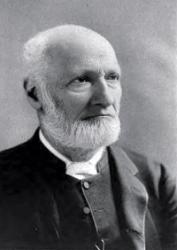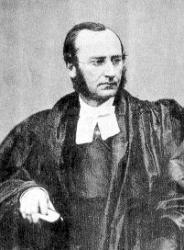Planning worship?
Check out our sister site, ZeteoSearch.org,
for 20+ additional resources related to your search.
- |
User Links
Person Results
Anonymous
Author of "A Babe Is Born in Bethlehem" in The Cyber Hymnal In some hymnals, the editors noted that a hymn's author is unknown to them, and so this artificial "person" entry is used to reflect that fact. Obviously, the hymns attributed to "Author Unknown" "Unknown" or "Anonymous" could have been written by many people over a span of many centuries.
Anonymous
N. F. S. Grundtvig

1783 - 1872 Person Name: Nikolai F. S. Grundtvig Author of "A Babe [Boy] is born in Bethlehem" in Service and Hymns for Sunday Schools Nicolai Frederik Severin Grundtvig was the son of a pastor, and was born at Udby, in Seeland, in 1783. He studied in the University of Copenhagen from 1800-1805; and, like some other eminent men, did not greatly distinguish himself; his mind was too active and his imagination too versatile to bear the restraint of the academic course. After leaving the university he took to teaching; first in Langeland, then (1808) in Copenhagen. Here he devoted his attention to poetry, literature, and Northern antiquities. In 1810 he became assistant to his father in a parish in Jutland. The sermon he preached at his ordination, on the subject "Why has the Lord's word disappeared from His house," attracted much attention, which is rarely the case with "probationers'" sermons. On his father's death, in 1813, he returned to Copenhagen, and for eight years devoted himself mainly to literature. The poetry, both secular and religious, that he produced, drew from a friend the remark that "Kingo's harp had been strung afresh." In 1821 King Frederik vi. appointed him pastor of Prasloe, a parish in Seeland, from which he was the next year removed to Copenhagen, and made chaplain of St. Saviour's church in Christianshavn. From the time of his ordination he had been deeply impressed with Evangelical church sentiments, in opposition to the fashionable Rationalism and Erastianism of the day; and adhered to the anti-rationalist teaching of Hauge, whose death at this time (1824) seemed to be a call to Grundtvig to lift up his voice. An opportunity soon presented itself; Professor Clausen brought out a book entitled Katholicismens og Protestantismens Forfatning, Ldre, og Ritus ("The condition, teaching, and ritual of Catholicism and Protestantism"). This book was replete with the Erastian Rationalism which was so especially distasteful to Grundtvig, who forthwith, in his Kirkens Gjenmsele ("The Church's Reply," 1825), strongly opposed its teaching, and laid down truer principles of Christian belief, and sounder views of the nature of the Church. This caused a sensation: Grandtvig (who had not spared his opponent) was fined 100 rixdollars, and the songs and hymns which he had written for the coming celebration of the tenth centenary of Northern Christianity were forbidden to be used. On this he resigned his post at St. Saviour's, or rather was forced to quit it by a sentence of suspension which was pronounced in 1826, and under which he was kept for 13 years. He took the opportunity of visiting England in 1829, 30, and 31, and consulting its libraries, mainly with a view to a further insight into Northern antiquities, and to help his studies in the early English tongue. His edition of Cynewulfs beautiful poem of the Phenix from the Codex Exoniensis, the Anglo-Saxon (so-called) text, with a preface in Danish, and a fri Fordanskning (free rendering in Danish), published in 1840*, is a result of this journey and enforced leisure. Tired of his long silence, his numerous friends and admirers proposed to erect a church for him, and form themselves into an independent congregation, but this was not permitted. He was allowed, however, to hold an afternoon service in the German church at Christianshavn. There ho preached for eight years, and compiled and wrote his hymn-book, Sang-Vdrk til den Danske Kirkce ("Song-work for the Danish Church"). He still worked on towards his object of raising the Christian body to which ho belonged from the condition of a mere slate establishment to the dignity of a gospel-teaching national church. In 1839 (the year of the death of King Frederik vr., and the accession of his cousin Chrisliem vni.) the suspension was removed, and he was appointed chaplain of the hospital Vartou, a position which he held till his death. In 1863 the king (Frederik vn.) conferred on him the honorary title of bishop. The good old man died suddenly, in his 89th year, on Sept. 2, 1872, having officiated the day before. As Kingo is the poet of Easter, and Brorson of Christmas, so Grundtvig is spoken of as the poet of Whitsuntide.
--John Julian, Dictionary of Hymnology,, p. 1001 (1907)
N. F. S. Grundtvig
Ludvig Mathias Lindeman

1812 - 1887 Person Name: Ludv. M. Lindeman, 1812—87 Composer of "[A Babe is born in Bethlehem]" in The Lutheran Hymnary Ludvig M. Lindeman (b. 1812; d. 1887) was a Norwegian composer and organist. Born in Trondheim, he studied theology in Oslo where he remained the rest of his life. In 1839 he succeeded his brother as the organist and cantor of Oslo Cathedral, a position he held for 48 years up until his death. Lindeman was appointed Knight of the Royal Norwegian Order of St. Olav, and was invited to both help christen the new organ in Royal Albert Hall in London, as well as compose for the coronation of King Oscar II and Queen Sophie of Sweden. In 1883, he and his son started the Organist School in Oslo. Lindeman is perhaps best known for his arrangements of Norwegiam folk tales; over the course of his life he collected over 3000 folk melodies and tunes.
Laura de Jong
Ludvig Mathias Lindeman
Philip Schaff

1819 - 1893 Author of "A Babe Is Born In Bethlehem" in Christmas in Song Schaff, Philip, D.D., LL.D., was born at Chur, Switzerland, Jan. 1, 1819. He studied at the Universities of Tübingen, Halle, and Berlin. In 1843 he was appointed a Professor in the German Reformed Theological Seminary at Mercersburg, Pennsylvania, U.S.A., and in 1870 Professor of Sacred Literature in the Union Seminary, New York. As translator, author, and editor, Dr. Schaff holds high rank, both in Great Britain and America. The various Histories and Encyclopedias which he has edited are standard works. His knowledge of hymnology is extensive, and embraces hymns in many languages and of all ages, his speciality being German hymnody. The hymnological works which he has edited alone, or jointly with others, are:—
(1) Deutsches Gesangbuch, 1860; (2) Christ in Song, a most valuable collection of original English and American hymns, and translated hymns, N.Y. 1869, London, 1870; (3) Hymns and Songs of Praise for Public and Social Worship, 1874, in which he was assisted by Boswell D. Hitchcock, and Zachary Eddy; (4) Library of Religious Poetry, 1881, of which A. Gilman was joint editor.
Dr. Schaff has not composed any original hymns. His translations from the Latin are meritorious. He died Oct. 20, 1893.
--John Julian, Dictionary of Hymnology (1907)
Philip Schaff
C. P. Krauth

1823 - 1883 Person Name: Rev. C. P. Krauth Translator of "A Babe is born in Bethlehem" in Carols Old and Carols New Charles Porterfield Krauth, D.D.,LL. D.: b. 1823, Martinsburg,Va.; d. 1883. pastor at Baltimore, Pittsburgh and Philadelphia; President of General Council 1870 to 1880; Professor at the University of Penna; professor of Theology, Phila., Pa.; author of "The Conservative Reformation"
Evangelical Lutheran Hymnal, 1908
C. P. Krauth


 My Starred Hymns
My Starred Hymns


